Luanne Rice's Blog, page 4
July 27, 2018
Shades of Blue
The blue changes, even within a minute or two, while looking at the same scene, at everything from sea to sky to whale spouts to rooftops to lobster pots to book jackets-- the iridescence, luminosity, darkness, all depending on the quality of light, the presence or absence of fog, the time of day.
Oh, all the blues:

Humpback whales in the Bay of Fundy, mother and calf

Brier Island as the fog clears--I love the receding fog bank, lilac, in the distance.

Fog starting to clear over Peter Island.
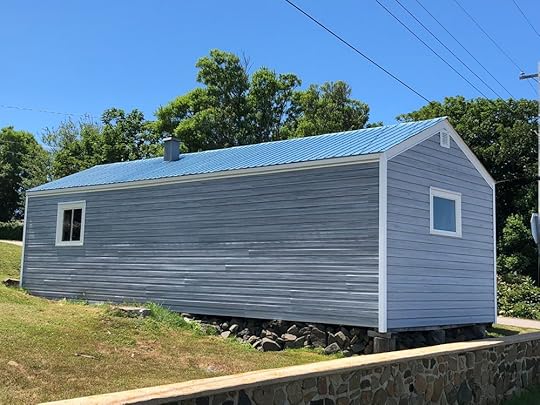
Blue roof.

Humpback calf

Foul weather gear drying on blue lobster pots.

ferry running between Freeport and Westport NS
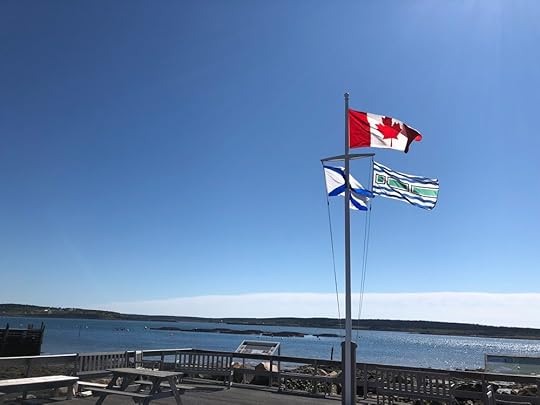
I love Canada.
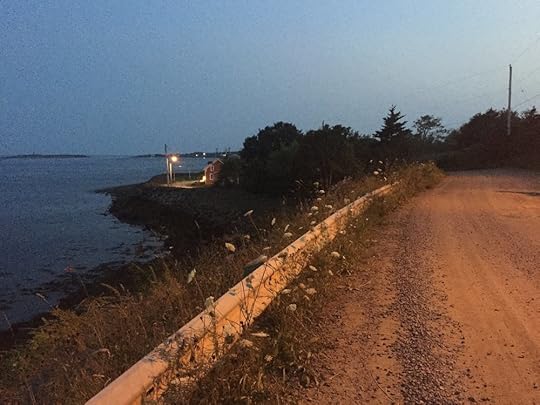
Evening on Brier Island

Same scene, a little later.

Gentle blue in rough weather.

Whale boat heading out.

O Evening Star, bringing everything that dawn's first glimmer scattered far and wide – you bring the sheep, you bring the goat, you bring the child back to the mother. ~Sappho

I love the blue of evening here on the paperback cover of THE BEAUTIFUL LOST, out December 26 2018, in which Maia and Billy head north to Canada in search of her mother, whales, the meaning of life, and the best lobster roll ever.
July 22, 2018
Morning at Seal Cove

The trail is marked by lobster buoys
It takes two ferry rides to get to this island in the Bay of Fundy off the coast of Nova Scotia--three if you count the longer one from St. John, New Brunswick, to Digby. Brier Island is a haven of peace and nature at the end of Digby Neck, surrounded by waters populated by humpback and minke whales, gray and harbor seals, dolphins and porpoises. Trails crisscross the island, and the one I took this morning leaves the back of the lodge, is marked by lobster buoys, and leads to Seal Cove. Through a field of tall grass, into the pine woods, the twisting path crosses streams, winds around boulders, angles down and then up steep hills, and emerges on a cliff high above the sea.

The scent of flowers, evergreens, sea wrack, and salt spray fills the air. Wildflowers are everywhere: rosa rugosa, hawkweed, the rare and endangered Mountain Aven, Queen Anne's lace, wild orchids, purple loofestrife, daisies, thistles--my very favorite--and many others I couldn't identify.

Wildflowers line the trail, and their scent fills the air. I love thistles.
The trail is lined with sea-silvered driftwood logs and root systems, thrown impossibly high above the tide line. Entire tree trunks have washed ashore. The buoys continue to mark the way, but at this point I began to follow the shore, mesmerized by the sounds of two foghorns--one from the Coast Guard Station at Northern Light, the other from Western Light. The cries of seals sound like mythological sirens and sea monsters. The seals were down on rocks exposed by the extreme low tide, and their calls pulled me closer, down the cliff, to get a better look. Once there, I heard the breath of a whale--hidden by fog, but very close to shore.

The wail of the foghorns was both mournful and comforting. A long hike can accomplish two seemingly opposing things: exhausting one's body and spirit so the focus is on the breath and getting to the next lighthouse, but also clarifying thoughts that might not be terribly welcome, that might be full of grief for the kitty who died a week ago. The good thing about a long hike is that there is also a better-than-average- chance that your feelings will roll in and out like the waves hitting the rocks, and that along with sadness, you're bound to feel the joy that nature always brings.
And then, just as the fog begins to clear, it's time to head back to the (L)odge...where the other kitty awaits. And soon the tide will change again, and I'll go to the passage at Peter Island to watch it flood, and the birds will be riding the crazy-swift current, fishing madly, and the fog might roll in again, or maybe it won't, but it won't matter, because it's all beautiful.


Home again
July 18, 2018
Black White Silver Gray
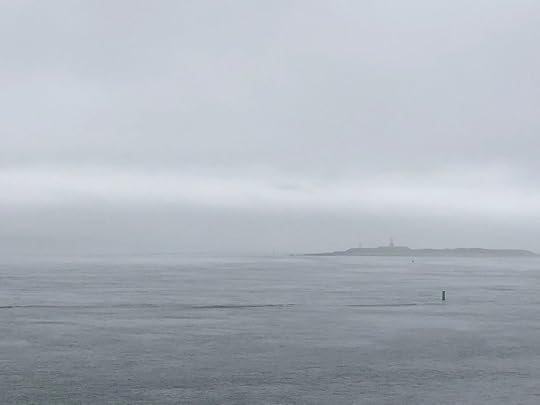
It is foggy on this island off the coast of Nova Scotia, the fog so thick it blurs the spiky pines and jagged rocks. You can hear waves crashing, fishing and whale watch boats entering and leaving the harbor, and the foghorn at the Coast Guard station, but you can't see them. The fog thins in spots when gusts of wind swirl it around, smashing it apart. Then it gathers again, seals the fissures of light, and blows in thick bursts over the wildflower meadow. The granite headlands jutting out from the coves are black, the sky straight above--closest to the unseen sun--is white, the fog is gray, and the breaks where light momentarily shines through are silver.
We have returned to this place where we came late last August. I loved the remoteness, the long views across narrow passages, the extreme tides and violent currents, the lighthouses at opposite ends of the island, humpback and minke whales swimming just offshore, sheep grazing outside our window, and the chance to spend a morning with a conservation group banding migratory birds. I held a Black-throated Blue Warbler in my hand at dawn one morning while an ornithologist I didn't know and will probably never see again attached a small metal band around its leg. Then I let the warbler go, and it flew away, and I wondered how far its migration would take it. When I returned to the hotel, the cats were waiting for me. They were happy to see me; it was time for their second breakfast. I remember thinking, we're coming back here next year, and every year, forever. But never would I have dreamt that this summer we would be two, not three.

Tim
Tim died one week and one day ago. It was exactly one year and three days after Maisie's death last July. His illness had been swift. He began to sit on my chest while I slept and bite my nose--not hard, but enough to wake me up. This was a change of behavior. He was trying to tell me something, but I had no idea what. Then he, who loved to eat, who would gobble his meals and if he hurried would move on to demolish Maisie's and Emelina's too, lost his appetite. He would take a bite at most, then walk away from his dish.
The first vet visits yielded no useful information--blood tests and x-rays looked normal. I felt reassured by the non-diagnosis, but he still wasn't eating, and he started crouching, immobile for long periods, a cat Buddha in deep meditation on the zebra rug. It seemed, in a way, he was hypnotizing himself so he wouldn't feel pain. I took him to a specialized veterinary clinic in Rhode Island.
An ultrasound showed enlarged lymph nodes and what might be an adrenal mass. To be certain of what the images meant, the radiologist would have to repeat the tests two weeks later--coincidentally, how long it would take to get an appointment with the internal medicine specialist. Tim was so relieved to be sprung from the hospital. I drove him and Emelina back to Connecticut (she went to his appointment with him--they are litter mates, identical twins, and they had never been apart) and he seemed so happy to be home, he ate a nearly-full plate of food. Well, maybe half, or a quarter, but more than the teaspoon-sized bites he had been taking.
New things began to occur. Suddenly he couldn't jump up on the bed. He would make a leap for it, grab onto the quilt with his claws, but be unable to pull himself up the rest of the way. He began staying in that Buddha position on the rug for an hour at a time. Through it all, he was as affectionate as ever. If I lifted him onto my chair, he would hoist himself up on the back to curl around my neck while I read or wrote. Once when I lifted him, he squeaked as if in pain.
On Sunday he began to drag his right rear leg, and that was that. This symptom, plus all the others. I knew, I just knew. I shouldn't have taken him back to the hospital. I should have just called our beloved house-call vet, who knows my kitties, who loves them, who has been Tim's vet since we moved back to Connecticut, who could have given him a gentle end. But no--I packed him into his carrier because--why? I wanted them to do those tests, to tell me exactly what was wrong, what those lumps and that mass meant, to explain to me why he had stopped being able to use his right rear leg. I wanted them to pull a miracle out of the hat. I wanted them to do what it took, to heal him, to tell me that Tim would be fine.
He wasn't fine. I knew, and I should have trusted myself, should have listened to what Tim was telling me. Instead he spent his last night in a hospital, with an IV in his paw. A vet tech told me Tim was one of the sweetest cats they'd ever had there, that he was so shy and nervous they had to put him in a special, quiet corner, with a little box in his cage where he could hide. He spent the night there because they were going to do an MRI in the morning. But when they brought him out to see me--Emelina and I were there to visit him--I could see what I'd already known deep down: he wasn't going to get better. Now, almost overnight, he couldn't use either of his back legs, couldn't get into his litter box. They suspected he had lymphoma that had spread to his spine, but they wouldn't know for sure without doing an MRI--they were doctors after all, scientists with the best equipment, top diagnostic tools. They were kind, they meant well, they loved animals, they cared for Tim, but I said, no, no, no, end his pain, don't put him through this, let him go to sleep now now now.
These are the memories that haunt me:
When Tim saw Emelina in her carrier, he tore himself out of the small bed they had set up for him and dragged himself inside with her--anything to get away, begging me to take him home, get him out of there. But I had to ease him out of the carrier--no, pull him out. I held him in my arms, tried to calm him. Kiss his head, try to soothe what was unsoothable. Hold him, tell him I loved him, my little guy, my Tim. He stared into my face with his gigantic green eyes, but not soothed at all--with pure terror. Animal instinct terror. Get me out of here, take me home, he was saying with his eyes, imploring me with his expression. But I could only whisper I love you Tim I love you Tim, and the vet administered the shots, and Tim went limp in my arms. It wasn't sleep, it wasn't peace, it was the death of my young cat.
Jen, our house-call vet, said she couldn't help thinking that he had been so close to Maisie, and she couldn't help but wonder if his illness, his death, could have been connected to losing her. If that is true, then love kept sick and sixteen-year-old Maisie alive months beyond her time, and the same intensity of love took five-year-old Tim's life a year and three days after she left this world.
Emelina cried for three days nonstop after Tim died. We took off, drove north because I couldn't imagine going home without him, and she searched the corners of every hotel room we stayed in, then searched them again. She wouldn't eat or rest. Both she and Tim had always been great travelers, but in the car she wailed. I think that is because I used to buckle their Sherpa bags into the back seat facing each other, so they could see each other through the mesh, and now he wasn't there. Until Tim's trip to the hospital they had never spent a night apart. He was her twin; they must have been unsure where one began and the other ended.

Tim and Emelina, the day I brought them home.
Emelina and I still haven't been back home. We drove through Maine, into New Brunswick and then Quebec, to the Gaspé Peninsula, finally back to Nova Scotia. We returned to this island where the three of us had come last summer. The fog has not lifted since we arrived. I don't want it to. The colors here are black, white, silver, and gray, just like Tim's fur. I can't stop thinking of his last 24 hours, how I wish they'd been different. This morning I took a long hike along the island's northwest coast. Things crossed my mind like, if I see a seal, it will be a sign from Tim. Or, oh, look, a monarch butterfly, the first I've seen this season, it's a message from Tim. What total bullshit. I can't even bring myself to wish for wishful thinking.
Right after Maisie died, this catbird began to harass me. She was constantly there, wherever I went. She flitted around the oak tree outside my kitchen window, where my desk is, crying-meowing-cawing nonstop. If I went into the living room, the catbird flew into a different oak tree, on that side of the house. Each morning she woke me up, perched on the roof outside my bedroom window, meowing loudly, insistently. I had never, once, seen this bird before Maisie died, and suddenly she was everywhere. "Do you think?..." I asked our house call vet. Jen is kind and spiritual, and she might have thought I needed something to grab onto, even the idea of Maisie returning as a catbird, so she said something "Hmmm." Or "I wonder." Or "It certainly is a coincidence."
Here on the island there is no sweet haunting. I look back, past Tim's last day and night, and remember all that is indelible: the way he loved us all, the way he used to walk Maisie downstairs each morning, bumping against her, not wanting even an inch of space between them as he led her to breakfast; how he would touch a soft paw to my face and leave it there while he gazed into my eyes; how he would put his paw on my palm as if he was holding my hand; how after Maisie died he took a long time to cuddle with his sister, but eventually he did, because that is how he was, he was too full of love not to.
Emelina has mostly stopped crying. She still has moments, searching for her brother. We stayed in this exact room last summer--is she picking up his scent? Is she hoping he'll come out from under the bed, from behind the bureau? She requires constant play--she wants me to waggle her catnip lobster, wave her feather toy, throw her tiny handknit moose so she can fetch it, shake it hard, pretend to kill it, then deliver it back to me. Tim never loved playing the way she does--he would be happy to watch from a perch on the back of my chair, or from the corner of my desk. If a toy came within reach, he would grab it with the swiftest paw imaginable, catch that flying handknit moose right out of the air, hold it just long enough for Emelina to see, then drop it. But Emelina loves to play. She is in constant motion, and I don't mind because I think it's distracting her.
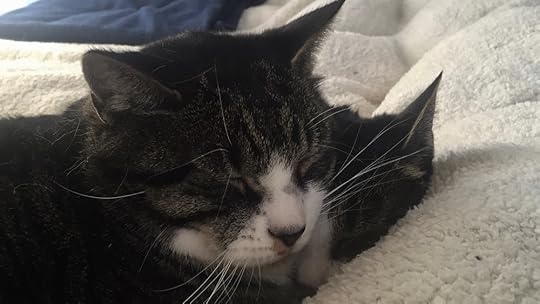
Tim with Emelina, post-Maisie
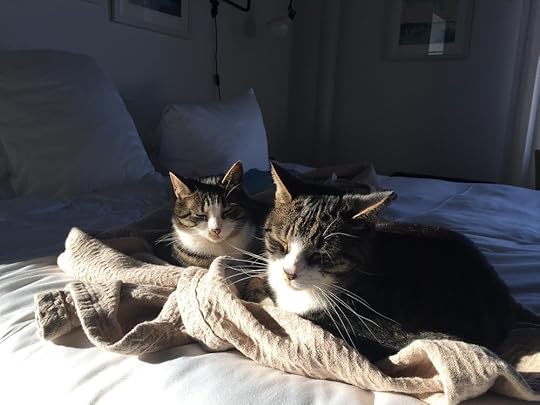
On the road last summer--at 250 Main, on our way to Canada
As I write this, I can hear the foghorn at the lighthouse on the north end of the island. The weather report said the fog would burn off this afternoon, and it is starting to. The mist is now more silver than gray. You can tell that blue sky is coming. The fog is dissipating, becoming translucent. Soon it will be gone. You can't hold on to fog. You can't hold on to cats. I want to say something hopeful, like you can hold on to love, but my heart isn't ready to believe that right now. Love hurts too much. It just does. It just does.
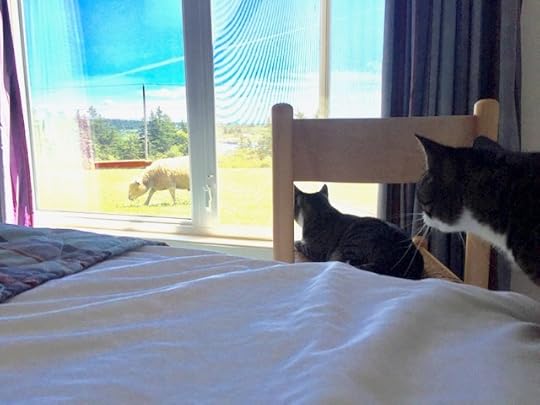
Last summer, two cats watching the action outside
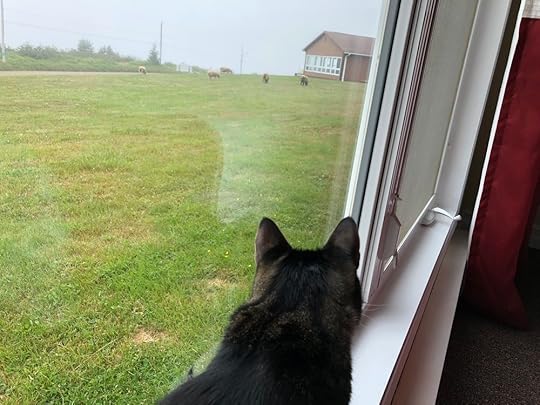
This summer, only one cat watching.
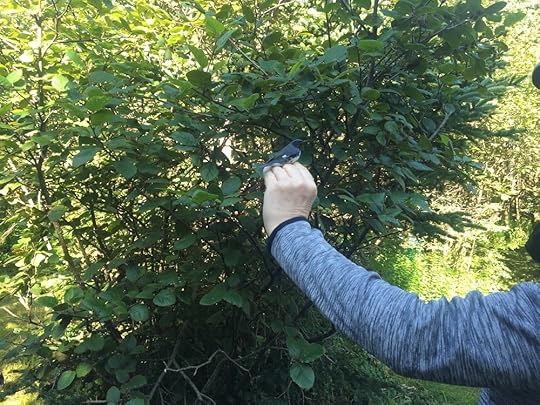
Banding a Black-throated Blue Warbler last August, a lifetime ago.

Tim on my desk.

Holding hands.
July 1, 2018
I'm Your Handy(wo)man
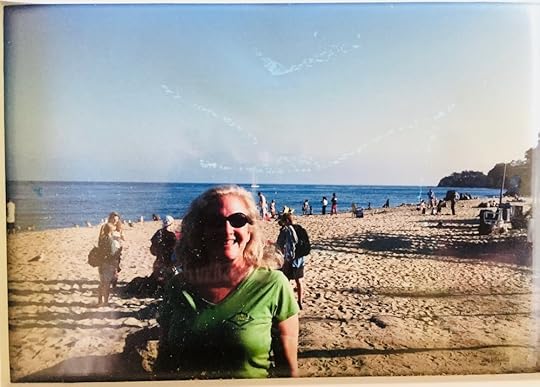
My sister Maureen after discovering the secret of sunscreen (*more on this photo at the end of the post).
Confession: I am not the handiest person. But sometimes I roll up my sleeves and go for it, such as I did today. I had a small painting job to do--two strips of rusty metal around the frame of a circa-1950 medicine cabinet. Off I went to the hardware store to pick up a tiny can of oil-based flat white paint and a sponge brush. We are talking about a task that would require about ten swipes of the brush, and that's about what it took; when I was finished, no more than twenty minutes after starting, I was pleased to see that the rust had been covered, and I hadn't dripped anything on the sink or tile.

Tools of the trade on basement workbench
But I had white paint all over my hands. And somehow I had forgotten to buy paint thinner or turpentine. I don't like chemicals or anything toxic in the house, and the all-natural Method, Seventh Generation, and Mrs. Meyers soaps and detergents in the kitchen and bathroom only made the paint stickier, and didn't take it off my hands. I thought of artists I know, the ones who work in oils, and how in their studios they always seem to have crescent moons of cadmium red, raw umber, tintanium white, and ultramarine around their fingernails, and how cool I think they are, but alas, I am not an artist, just a weekend hacker with a foam wedge that doesn't even deserve to be called a brush. So how to get the paint off?
And then I remembered: sunscreen.
If you are walking on a beach and get tar on your feet (more likely in California than Connecticut), sunscreen can strip it away. And since tar is a viscous material made of hydrocarbons, aka oil...would this remedy possibly work on the oil-based paint on my hands?

Maureen and Olivier at Paradise Cove--a winter visit, the year after the sunscreen episode.
I learned the sunscreen secret while having lunch at Paradise Cove with my sister Maureen and her husband Olivier. They were visiting me in Malibu, and as usual when we get together, we went straight to a beach. Not hard to do, since Malibu is one big beach hard by the Santa Monica mountains. We had walked barefoot along the water's edge, and when we went to our table on the sand, under the awning, we discovered that our feet were pretty tarry. The waitress told us it happened all the time in the Cove, and to go ask the lifeguard for sunscreen, which would swiftly remove the tar.
So we walked over to the lifeguard, standing near the tideline in red board shorts and a navy blue hoodie, with the lifeguard's red cross on the back.
The lifeguard was Matthew McConaughey. (Yes. That .) He glanced at our feet, laughed, and gave us the sunscreen. We took back to our table. When we were finished wiping off the tar, my sister returned the tube to him (thus the smile on her face in the photo* at the top of this post, and if you look over her left shoulder, in the distance you can see Matthew in his red shorts, keeping the beach safe for all.) Come on, are you surprised? He lived nearby, he surfs, he was giving back to his community.

Whether sunny or cloudy, don't forget the sunscreen.
Thanks to that lesson, today I was able to scrub my hands with Alba SPF 45 , and the oil paint washed off like a dream. The medicine cabinet is painted, my hands are clean, and I got to travel down a favorite memory lane. Plus, turns out I'm handier than I thought.
*This is a photo of the photo. I couldn't find the original in my files, so I snapped a shot of the one I have framed on my desk.
June 26, 2018
The Summer Days of June

Summer is its own gift, from the solstice to the equinox, but there is something about the first nine or so days, the June part of summer, that feels most wild and tender. We've made it through winter, and, as in this year, a tempestuous spring. It was cold, we had blizzards, it was rainier than usual, and a friend left this earth. But here right now is the morning sun, incredible warmth, the green marsh, the call of Red-winged Blackbirds, the sparkling Connecticut River, the glass-calm Long Island Sound.

Morning sun on Long Island Sound.
What if, in early summer, we stopped scrolling back through what's done, we allowed ourselves respite from worry over what to do next? What if we listened to a voice deep inside, telling ourselves to just be? I'm trying to do that right now. Take in the beauty, listen to the birds and the wind in the reeds, watch my indoor cats intent on chipmunks racing across the yard. Writing, always writing, letting my imagination follow the slightest hints from the interior, forgetting about outward demands.

This year's bright flowers.
I have a terrace garden. Beautiful flowers and one tomato plant, all in pots. Some years I choose pale colors--the softest blue, palest rose--but this June, everything needed to be bright. Hot pink petunias, peach hibiscus, sapphire-blue lobelia. Chase winter, greet the solstice. Having a comfortable chair is key, and I've placed it in the shade and sit outside to write and be. For me, writing is being. It's how I exist. I used to say it's how I make sense of the world, but I've come to believe, with a deep bow to David Byrne, that advanced spiritual practice is to stop making sense.
I saw Stop Making Sense in Paris, in a theater in the 5th arrondissement. It was quite a long time ago and I was living there, homesick for my family back in Connecticut, trying to improve my French by memorizing dialogues provided by my teacher. Every day I would walk the Seine (in those memories it's always winter, the buildings silver-gray and the river stone-green) from the Pont de l'Alma to the Pont de Sully, at the far end of Île Saint-Louis, and back along the quais of the Left Bank.
One particularly cold day, I left my usual route to warm up in a café off the Boulevard Saint-Michel. When I spotted the documentary's title on a marquee, I felt instantly drawn in. I entered the theater and the world of the Talking Heads, losing myself for an hour-and-a-half in their music. The film has stayed with me, and so has the title: a challenge, an admonition, a goal that has become easier, has in fact become a simple reality as life has gone on. (Can you honestly say you can make sense of...anything?)
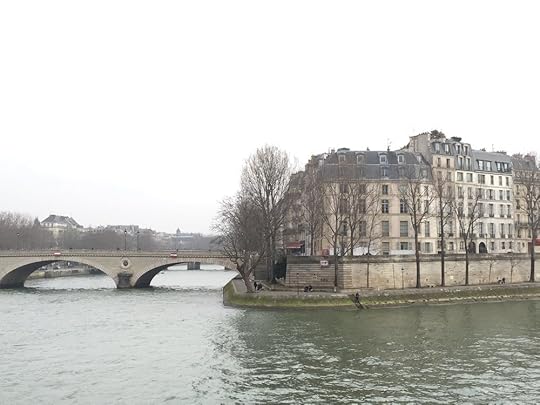
Paris in winter
Eventually I fell so in love with Paris I would have stayed forever, and in those memories it's always June, with the roses at the Musée Rodin always in bloom, with peonies for sale at the flower markets, with long evenings at cafés--especially Stresa--lasting until ten-or ten-thirty PM when daylight finally began to fade, with red geraniums spilling from the wrought-iron balconies of Belle Époque buildings throughout the city.

The Musée Rodin in June

Flower market on the Rue Cler.
Perhaps those bright flowers, those eternal Paris Junes, inspired my garden this year. A desire to hold on to the un-hold-on-able, to write in the sun, to accept the season's blissful warmth, to feel happiness, to sit in my comfortable chair and just be for as long as I can. Same as it ever was...

March 4, 2018
Frances McDormand

Frances McDormand is nominated for a Best Actress Academy Award for "Three Billboards Outside Ebbing, Missouri." Here she is with Bill Pullman in "Crazy in Love," the first movie made from one of my novels. She played Clare, giving the character an edge that made the secret she was keeping all the more shocking. When Martha Coolidge (our great director) shot at the Bremerton Naval Hospital, Frances and I both gravitated to the WWII vets who were patients there. One of them gave her a hat from the ship he'd been on, and she wore it for the rest of the shoot. (The Coen brothers—her husband Joel and Ethan were with her, adding to my surreal thrill-factor.) Here is the great cast—Bill Pullman, Holly Hunter, Gena Rowlands, Julian Sands, and Frances. (Seriously, can you imagine?) So I will definitely be watching the Oscars tonight--fingers crossed for Frances (not that she needs it.)
February 8, 2018
It Couldn't Happen To Me (Republished)

Cassat_CupOfTea
I met him right after my mother died. We fell in love right away. In retrospect there were red flags, but I didn't know how to read them.
He had a hard luck story, an awful childhood. Hearing about it filled me with compassion and a desire to help him. Now, looking back, I don't know how much of it was real. Lying came with the package.
I saw the good at first. He was handsome, funny, friendly, interested in life. When I talked, he seemed to anticipate my next word, seemed to understand me better than I did myself. He listened to me talk about my mother's long death, and he'd hold me and tell me she was up in heaven. He meant it literally: puffy white clouds and angels with harps. This was new for me, a person who spoke of death in such simple, childlike ways, but I latched on and accepted the comforting image.
He also said, from our first night together, that we were Made in Heaven. "Heaven" came up frequently. I was a once madly devout child but had fallen away, and he was a serious Catholic, and I felt spellbound by the thought of my old faith, embodied by this man who said he loved me. We'd walk through the city and most walks included more than one stop in church. He'd light a candle and kneel, head bowed in deep prayer, and somehow that made my heart open a little more.
The beach; he did love the ocean, and so did I. We could spend hours walking the tideline in any weather, swimming when we could, lying on the beach and staring at the sky. He told me he loved surfing.
Our love story happened fast--a whirlwind romance--and lasted until we were married six weeks after meeting. Right after I said "I do" everything changed. He quit his job so I would support him, disappearing whenever he felt like it. He didn't speak to me so much as growl.
I was strong, "myself," at the beginning. But he wore me down. I was one way the day we married, and quite a different way by the time I finally left. My bones aren't broken, he never gave me a black eye. Yet his need for control wore me down--to this day I'm shocked to think it happened at all.
When he yelled, his voice boomed so loud it reverberated through my bones. His eyes scared me. He raged at me. Or he'd go silent for days, not saying one word but giving off hateful energy, brushing past me hard enough to knock me aside. His physical changes were so extreme and violent; I felt I was watching Dr. Jekyll turning into Mr. Hyde.
After a while we'd make up and he'd beg me to understand HIS pain, and not to leave. He could be so charming, seeming to love me. People on the outside saw a handsome, friendly man. Sometimes I saw him that way, too.
I had close women friends. I would confide in them. Some got sick of seeing me drain away; they must have felt frustrated to watch me be stuck in something so bad. They would say something real to me, and I'd agree, say that I had to leave. Then he'd be nice again, and I'd remember the harsh words my friend had spoken about him. Eventually my friends drifted away. Or I did.
His first wife, the one before me, is a great woman. We respected each other from the beginning and have become close as we've gone along. She was one of the few people I could really open up to--because she got it. While pregnant with their child, she'd been hammered on the head by him, one night when he'd come home late from the grocery store where he worked. She still has skull pain and hearing loss from that beating.
He had gotten arrested for beating other women--after his first wife there were girlfriends, and incidents, and nights in jail. He learned not to use his fists. If you don't leave marks, you won't get arrested. He told me that he had once broken a woman's jaw in three places, the message being that he could do that to me.
Why did I stay with him?
Check out the Cycle of Violence diagram. That part, when you decide to believe his explanations, is called the fantasy or honeymoon, and it happens over and over, and it's unbelievably destructive. Each time I decided to stay, it chipped away a little more of myself.
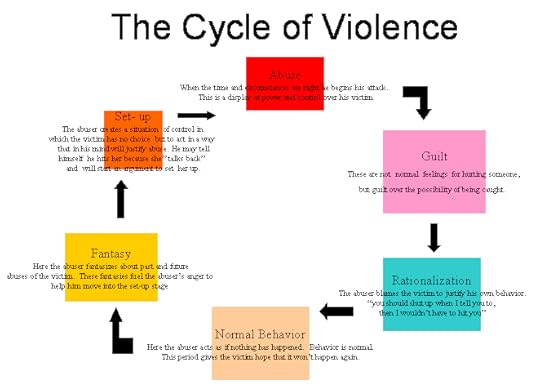
Cycleviolence
I used to drive past a domestic violence center, but I never stopped--wasn't that for women who were bruised and bleeding?
Holidays became a time to brood and suffer. He'd brood, I'd suffer. Eventually we shut everyone out. He liked to sit in a big armchair, right in front of the fire, staring at the flames. If I interrupted his fire-watching, he'd glare as if he wanted to roast me. I spent many many hours feeling dread and fear. Paradoxically, he was big on sending out Christmas cards--it was all about the show, giving the appearance of a marriage. He kept a detailed list of people who would receive our cards each year. He wrote them out and addressed the envelopes. He'd sign them, "May your new year be blessed!" He spoke about God and religion frequently, had prayer cards and rosary beads and miraculous medals and spiritual books. Meantime he wouldn't be speaking to me.
Driving ragefully: it got worse toward the end. Once we were heading to Woods Hole, and I said or did the "wrong" thing, and he told me he was going to kill us both, drive us into a tree. He sped up, onto the shoulder--I felt and heard that buzzing friction of pavement designed to let drivers know they're going off the road. I was terrified.
That was the end for me--I told him I wanted a divorce, and this time I meant it. When his ex-wife's father heard, he called me and said, "He's left a lot of wreckage in his wake."
I went to that domestic violence center I'd passed so many times, and found loving support. The women there really helped me realize emotional battering is as bad as any other kind. I wish the courts and our society would recognize that emotional and psychological abuse leaves scars which, although you can't see them, are just as terrible and deep.
At one point I began writing a novel (writing has always saved me) about a woman who was married to a man with secrets. The husband was a white collar criminal, a banker who had committed fraud. Researching the character, I spoke to an FBI agent in the Oklahoma City field office. I told him the scenario, then told him about my own marriage. He told me I should try to talk to women he was involved in with before me, to see if he had treated him the same way.
I remembered one woman's name. I tracked S down and called.
"I've been waiting for your call," she said, when I identified myself.
She knew he wouldn't change. That is a pattern with abusers--the behavior continues on and on. She described his patterns--so familiar to me, his abuse, the way he had made her feel it was all her fault even while taking every single thing she had, sucking the life out of her. I loved her then, and I love her to this day, and am forever grateful to her for sharing with me. She came to court, to testify for me in the divorce--to testify that she went through the same horrific treatment I did--and I will never forget the look on his face when he saw her walk into the courtroom.
Here's what I know: I'm strong and independent. I have wonderful friends and family, including his ex, and a life and career I love. Domestic violence can happen to anyone. To learn more about that, and to get help, I recommend reading Patricia Evans's powerful book The Verbally Abusive Relationship, and to visit websites such as The National Coalition for Domestic Violence and the National Domestic Violence Hotline.
My own linked novels, Summer's Child and Summer of Roses, as well as Stone Heart, The Perfect Summer, and Little Night deal with domestic abuse. I am proud to be involved with the Domestic Violence Clinic at Georgetown University Law Center, headed up by Deborah Epstein. Law professors and students advocate for victims of abuse in Washington, DC. They take their cases to court and fight for them. Their work is extraordinary.
Good luck to anyone reading this--with love and support to you.
(The painting at the top of the page is Tea by Mary Cassatt.)
My novel LITTLE NIGHT deals with domestic violence and its devastation on the women in one family... Thank you to all the readers who've written me with their own stories. I am honored and grateful.
July 20, 2017
Beach Friends and Sand Grain Wisdom

Mystery of the sands
My beach friends and I have always stayed in touch by letter. Sometimes telephone, more recently texts and email, but mostly letters. There is something wonderful about stationary, about seeing familiar handwriting, about choosing just the right stamp, and about sometimes slipping in a surprise--a pressed flower, a fall leaf, a trickle of sand from the beach. I thought I'd share with you this exchange. The person to whom I'm writing is my age; we grew up together at Hubbard's Point. When you love the beach, children's stories, the simplest truths can come to mean even more as you get older.
From my friend:
What are the seagulls and waves doing down there? Have you had pleasant weeks since I saw you? Not sure when I'll be back down, but I am sure trying to lean that way. The thought of the lovely Point and its summer breeze, sun and clouds and sunsets and moonrises, these are thoughts I am fortunate enough to have wafting through me at the moment, so I wondered what the latest sand grains said when they rustled in the waves. You seemed like a good person to ask. I miss that place right now, that's for sure.
My reply:
Last night the seagulls were crying as they flew home to Gull Island and again this morning as they woke up before dawn. The waves are quiet today. We had a couple of windy days last week that kicked up lots of whitecaps. Early this morning two people were surfcasting off the beach--I didn't see if they caught anything, but rumor has it stripers are running. I watered the garden just as the sun rose out of the Sound, and the air was cool, but now the heat is rising.
I have thought about your question, what the latest sand grains said when they rustled in the waves, so late last night I went down to ask them.
The water was mostly clear, under the light of a waning quarter moon, and you could see the sand grains--mostly mica, sparkly and black in the stretch in which i stood, tossing and whirling and glinting gold. A few grains of granite and quartz joined in. The action--the way they turned and rolled in the waves--looked both festive and somber--like a party with an underlining serious purpose. So I asked them, "What are you doing?"
"What we do every day, every night," a sliver of rose quartz replied.
"Yes, but what is it?"
"We are dancing," a large granite pebble said.
"Not just dancing," a chorus of mica said. "This is our work!"
"Work?" I asked.
"Of course!" said a barnacle who happened to be attached to a piece of sea lettuce, wafting like a green silk scarf through tunnels of tumbling sand, "It's our job to keep it all going."
I thought about that, wanting to grasp the meaning. As a lifelong beach girl, I thought I should know. But since I didn't, and since it's alway best to ask when you don't understand, I said, "Keep what going?"
"The planet!" the mica said. "It's how the world turns, how the forces of gravity and centrifuge and tides and currents continually propel the earth on its axis. We have to play our part!"
"Everyone thinks we're just sand," the rose quartz said. "But..."
"We're more than that," a fragment of granite said. "We work with the waves, and wave action is everything. It's pure energy, it brings life to the intertidal zone, even into the mouths of rivers. And we provide shelter for mollusks, crabs, lobsters, flounder. We give life!"
And that made sense to me. Yes, it did. Now I understood. I walked down from the tide line and stood barefoot in the shallow waves. The sand tossed around, swirling over my toes. A million flakes of mica tipped and dove in joyful formation, like murmurations of starlings flying above a field. My feet were buried in silt, but I felt the dance going on around me, tickling my ankles, lifting my heart.
"How long will you do this?" I asked. "How long have you done it?"
"Forever," the quartz sand said.
"Forever," the granite pebbles said.
"Forever," the mica shards said.
And I heard that word, forever, and felt the fullness of it, felt the swelling of love in my heart for nature and our beautiful coast and seas, for beaches, for our beloved Hubbard's Point. And even after the sand stopped speaking, I could hear the word in the waves: forever, forever, forever, the waves were saying, taking up the chorus of the sand. It was the language spoken by the ocean, from the beginning of time, the one word among all others we would hear until the end, until the last wave hit the last shore. But there is no "last," no "end," because the ocean, the sand, and love will go on forever...
Hope to see you soon.
Love, Luanne

Life and death.

Hubbard's Point
July 7, 2017
Maisie

1.
Oh little girl. You were the baby among the original three cats, and somehow, over your lifetime, you became an old kitty. It took you a long time to warm up to me--to anyone. You were made for the outdoors, for alleyways and forests--but I kept you inside. Your spirit couldn't be contained. You would gaze through the window at the rising sun. You would stare at the moon. You had an inner life. You had angry eyes and a twitching tail. The kittens arrived a year after Maggie and Mae Mae died, after you'd had a taste of being the only cat in the house. Although you were first wild with anger, you slowly let in Tim's love and it changed you. In time, you began to tolerate me and Emelina. By the end, I would say you actually loved us too, not just Tim.


That glamorous girl with the mean green eyes.
Here are photos of Maisie, Tim, and Emelina--all three--together after...well, after Maisie softened toward the world. It took Tim to help her do that. The expression in her eyes became (mostly) less sharp:
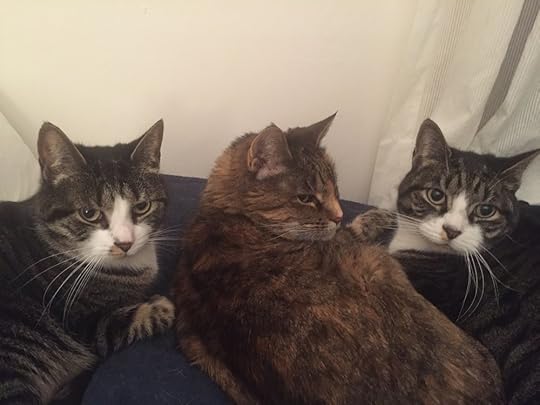

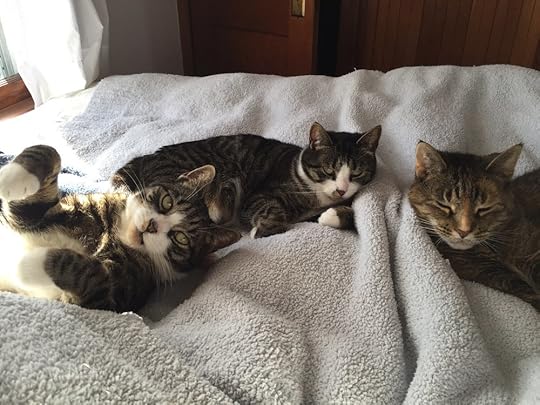

2.
Love transforms.
(Maisie and Tim)

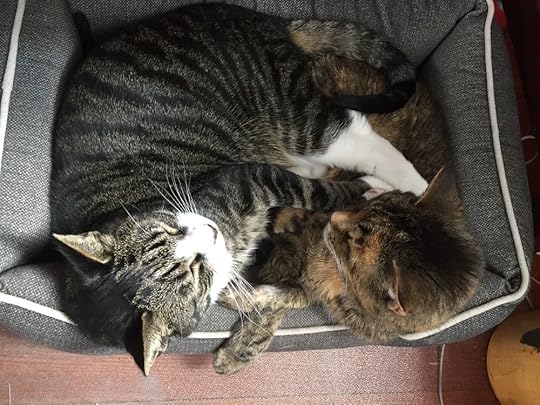



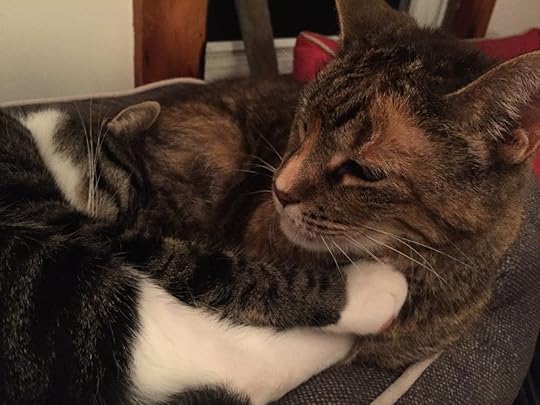
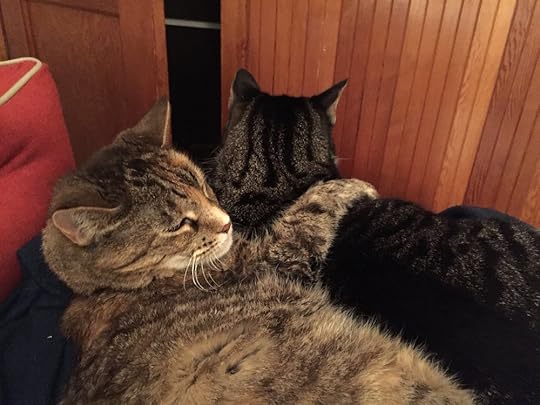
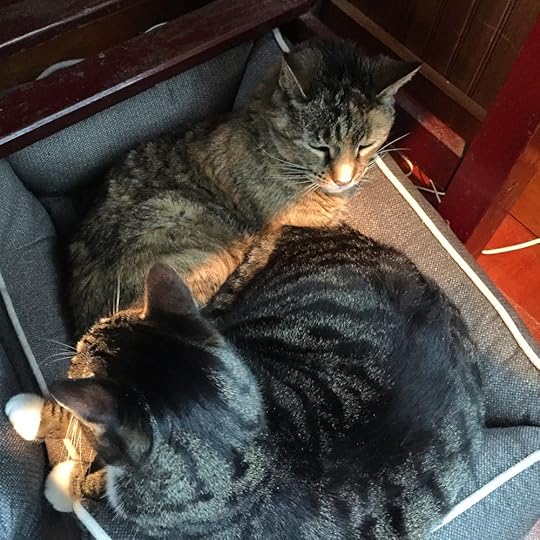

3.
Cats are like humans while, at the same time, being nothing like humans or any other creature on this earth. They listen with their fur. They live for night, for the whisper of mice in the walls and bats in the trees. They see ghosts in the moonlight, and if you follow their gaze, you will see them too. Legend has it that cats are the familiars of witches, but that is only partly right. They belong, mainly, to the angels, both dark and light.
The way cats are like humans is how they need both solitude and connection. They can hide so completely--right there in your own house, every inch of which you know, in closets or the cellar or the attic or the chimney shelf or the back of your sweater drawer--and you will never find them. But when they are ready, they come twining around your legs, leaping onto the back of the chair where you sit reading, nudging your hand so you will pet the back of their heads, in the exact spot where their mother licked and cleaned them with her rough tongue when they were babies, to let you know they need reassurance of your love, oh they need it so badly.
4.
Maisie started out all cat, but during the last year of her life, she became at least partly human. I began to understand her. We started speaking the same language. This is how she told me that she was sick. The change was subtle. I might have missed it. We had mostly moved back to Hubbard's Point after mostly living in New York City and Malibu. This was the house she had come to as a kitten. Perhaps the ghosts that live here called to her. In response, I called a vet who made house calls--Dr. Jennifer Hall. Something was wrong with Maisie, and Dr. Hall had to find out what it was.
She did find out--Maisie had a collection of illnesses that had been hiding for a long time. This was in September 2016. For months, through autumn and the cold winter and all of blessed green spring and into the summer, Dr. Hall came every week, like the veterinarians of dreams and literature. She tended to Maisie. Now, Maisie wanted to live--that was certain. She couldn't bear to leave Tim, and he wouldn't let her. But Dr. Hall is an angel, an angel of light who heals with a combination of science, intuition, and love, who ministers to the animals but also to their humans. Without her, Maisie would have gone long ago.
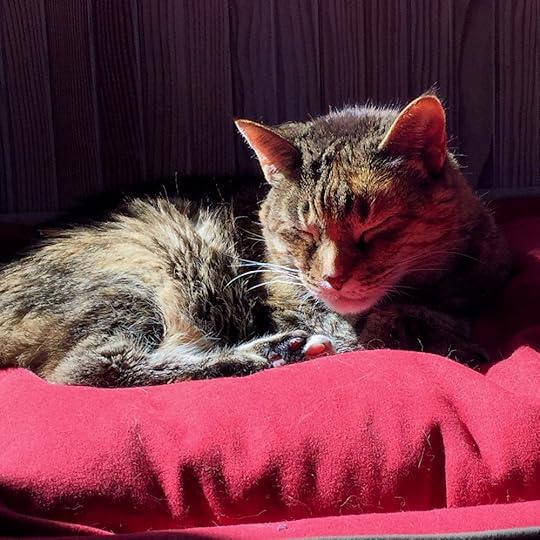
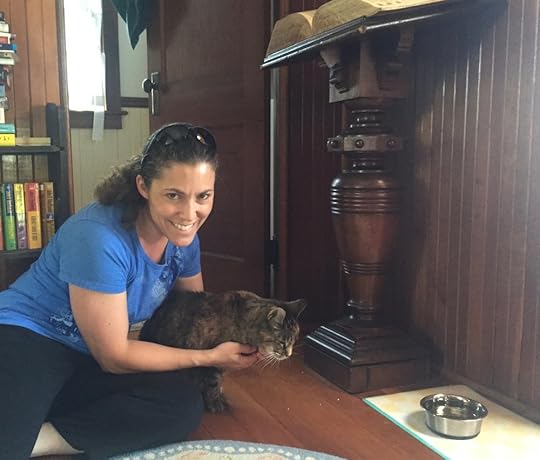
Dr. Jennifer Hall, our wonderful veterinarian.


Dr. Hall and assistant Tammy. We are so thankful for all their care.
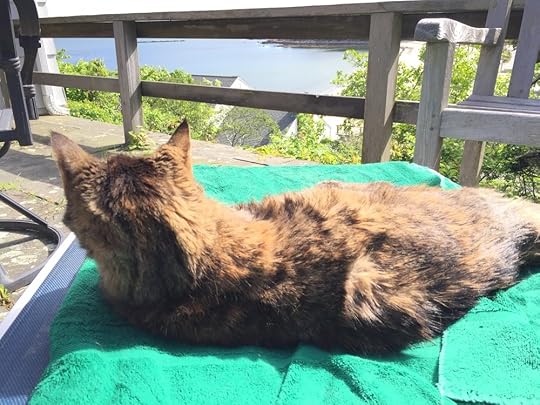
My ride's here.
4.
As the first day of summer approached, Maisie began to die. I saw her start to walk toward death. Her steps were slow but sure. Tired by her journey, she slept a lot. There were some nights she didn't jump up on the bed but instead found a dark place in a closet or under the 1800's desk my love had found for me at Clignancourt, Les Puces de Saint-Ouen, when we lived in Paris. No matter where she hid, Tim would seek her out. He would lay against her side, pressed so close there was no chance of an inch of space between them. His warmth must have felt good. His presence kept her tethered to our house, to our lives and her own, kept her from drifting too quickly into the dream of death. Still, though, she kept walking in that direction.


5.
In June I started taking Maisie outside. She was too weak to run so I knew she wouldn't disappear through the lattice under our neighbor's cottage or up the old and spreading red oak tree. I knew she wouldn't chase the 20 or so bunnies that live in the lily patch and under the rock ledges. There was no way she could kill the birds--I counted six species at the same time--that darted through the branches and oak leaves above us, squawking and crying that a cat, a predator, was out and no one was safe. Except they were, because Maisie moved so slowly.

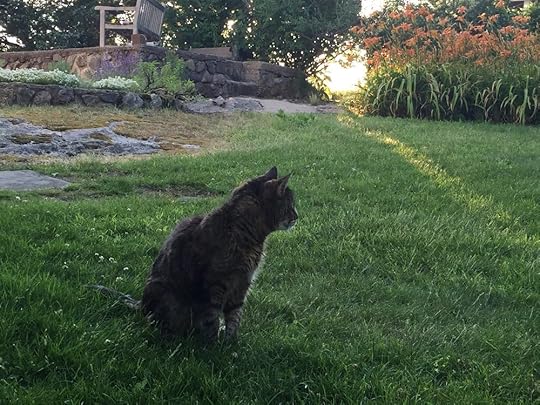

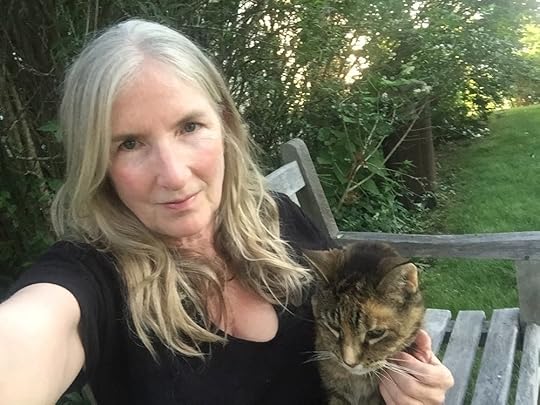
6.
I planted a garden. This yard had been badly neglected during our years away. I thought of the garden as life. I wanted the snapdragons, larkspur, clematis, bee balm, cosmos, delphinium, sweet peas, shasta daisies, coreopsis, and zinnias to bloom and bloom, as if all that beautiful life could chase and vanquish Maisie's death, because I felt it coming. I placed a teak bench beside the privet hedge, and while bees buzzed behind our heads, Maisie and I would sit there in the summer evening while I fed her shrimp by hand.


7.
There were days when she seemed to rally. I'd get my hopes up. This wasn't cat hospice after all--Maisie's health was going to improve in a real and substantial way. She was only sixteen. To some people that might sound old, but I've heard of cats who live to twenty, twenty-one, twenty-five. One friend had a cat who lived to be twenty-nine, and every day he fished off a dock that jutted into the Connecticut River at Brockway Ferry in Lyme, catching shad with his right paw, eating the fish--even though he'd lost most of his teeth--and spitting out the bones. Then he would go into the house, up the creaky stairs, into the back bedroom closet, pee on the shoes, and fall asleep.
So sixteen seemed very young to me and I hoped and honestly believed that Maisie would get better. These hopes were not just for me. They were for Maisie, Tim, and Emelina. We are a family, after all. But the rallies were small, and they fizzled out, and each time Maisie would be a little older and more tired, a little more ragged. Dr. Hall lovingly began to call her Grizabella, and so did I.
8.
You see, I had this plan. In Laurie Anderson's Heart of a Dog she talks about how, when their terrier Lolabelle was very sick and they knew she wouldn't get well, Laurie and her partner Lou Reed brought her home from the hospital. There would be no putting her to sleep. Lolabelle would be comfortable, and she was, and she would have the dignity and process of her own death, without anyone taking it away from her. I love Laurie, and that way of treating Lolabelle felt right to me. Here are the notes I made when I made the decision not to put Maisie to sleep, but to let her go in her own time:
When Dr. Hall was here, I apologized and apologized, feeling bad for having her come here on both Saturday and Sunday. We both cried, and she said don’t be sorry.
Maisie not eating, drinking just a little—but sitting up, walking upstairs, now sitting in her bed beneath my desk.
Dr. Hall said if this was CATS, Maisie would be Grizabella and Tim would be a stagehand.
People expect you to put an old/sick cat to sleep.
Friends ask, expecting me to have made that decision.
I don’t want her to suffer—but she’s not suffering. She is peaceful. She purrs when I scratch under her chin and the top of her head.
This morning Tim nuzzled her when she walked into the kitchen.
Am I letting her tell me what she “wants?” She is still comfortable and enjoying small things in life. This morning I opened the screen door and she walked outside.
But she is listless, sometimes goes into the dark closet upstairs in the bunkroom, isn’t eating (just a few bits of fluke I cooked for her,) is drinking less and less—only a few laps from her water bowls. (Three, and I keep them all filled to the top with fresh water, the way she likes it.)
9.
After everything, Maisie died yesterday. In spite of my plans, my well-thought out plans that would let Maisie just fall asleep on her own, I saw a big change in her, saw her cringing, her hind legs going out from under here, and at 7: 30 a.m., within minutes of noticing, I texted Dr. Hall. While we waited for her to come, Tim did what he always did: tended to Maisie. He kissed her while she tried to drink water. He loved and comforted her, and, probably himself. What will he do without her? The one thing I knew was that we couldn't let Maisie suffer in her body. Not for a minute. Tim, Emelina, and I sat on the bed while Dr. Hall gave Maisie the shot.
10.
After Maisie died and her body left the house, Tim stayed on the bed. He kept trying to burrow under the blanket she'd always slept on, looking for her.

11.
When it was time for dinner, I called out "are you hungry?" That question had always summoned the kitties from wherever they were. Tim had, every single time, accompanied Maisie down the hallway to the kitchen. He'd press against her, leading her toward food, sometimes tripping her, he walked so closely. Last night he ran around the house, searching for her. Of course she wasn't here. He ran and ran. He looked everywhere. I had to wait for this to end, I couldn't rush him. He had to discover for himself.
After a while, after he had worn himself out, I asked more quietly, "are you hungry?" and both he and Emelina came into the kitchen. Patrick had sent us flowers of sympathy, and the kittens (forever the kittens, no matter how old they are) had to inspect.
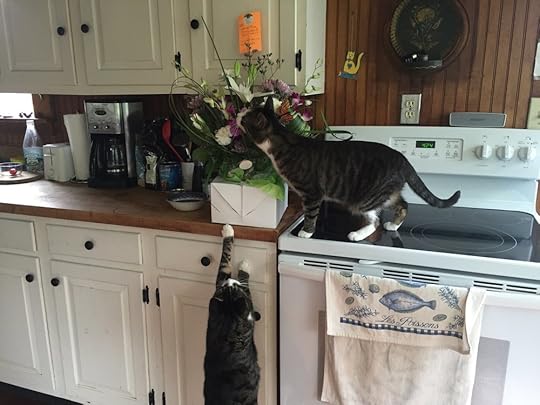
Maisie is in the bardo. Laurie Anderson says that the one thing the Tibetan Book of the Dead prohibits is crying. Crying will encourage the dead to stay here, in this realm, with us, but they can't stay. They have to leave.
But, see, I cried: I cried before Maisie died, while she was dying, and when she had stopped breathing and I held her body.
Last night, after Tim finished his search, he and Emelina walked to their bowls. They began to eat. Perhaps by crying I had caused Maisie--not her body, but her ghost--to stay. I'm pretty sure the kittens felt, as I did, Maisie's spirit in the kitchen.
Just out of the corners of our eyes, her tail was twitching. I saw it last night. I don't see it today. Maybe Tim and Emelina do. I hope Tim does.

An Evening at Hubbard's Point

Thank you to the "Hubbard's Point" Women's Club for hosting such a wonderful evening of warmth, books, and beach love. My lifelong love for this magical place grew even stronger tonight. I loved being able to celebrate THE BEAUTIFUL LOST with so many avid readers.
I wanted this evening to happen in order to express my love for our beach, to acknowledge how lucky I've been to live here, and to honor the fact so many others feel the same way. I told how my grandparents on both sides--one a policeman, the other an ice cream man--built cottages here, how my parents met here after the war, what it was like to grow up in a paradise of nature, salt water, family, great friends, a kind of innocent abandon. I gave each attendee a copy of one of my Hubbard's Point novels--titles such as BEACH GIRLS, TRUE BLUE, THE PERFECT SUMMER, SUMMER OF ROSES--all inspired by memories, nature, friendship, beauty, longing, and loss here at the beach--and told how the name was inspired by my amazing neighbor, Helen Hubbard, an opera singer whose voice as she sang scales early each morning rose over the gentle waves breaking on the rocks and served as my wake up call. Growing up surrounded by art and artists--Helen, my mother writing and painting, other strong women on the Point--I still feel blessed and in awe.
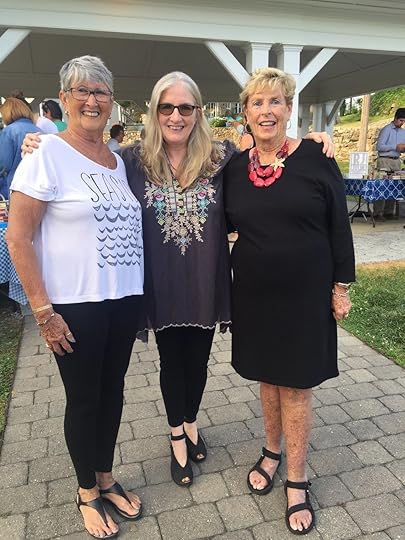
Jan Tauro Tonucci (left) and Danne Pineo (right) are co-presidents of the "Hubbard's Point" Women's Club. These wonderful, generous, creative women do so much for the beach, and i am very grateful for all their hard work and enthusiasm that made tonight so much fun. They made sure the house was packed! It was great. And thanks to Will Bagnell, a bookseller from RJ Julia, back right, for selling so many books (in addition to the ones I gave away, especially THE BEAUTIFUL LOST.

The pavilion was full, with extra chairs curving out to the basketball court and stone wall.
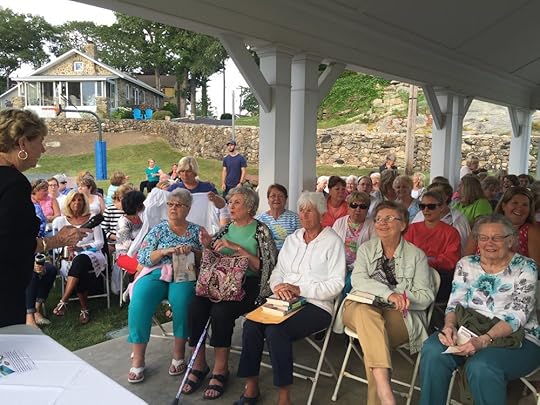
A wonderful crowd of (mostly) Hubbards Point-ers. I grew up here and saw old friends I've known since we were babies on the beach together, new friends I've met in recent years, the children of friends my age, and people who knew my parents since they were teenagers. An incredible place, and I feel so lucky to have been coming here for so long.

I'm so thankful to these women--three generations of the Pineo family--for an amazing event. Danne Pineo (right) is the co-president of the Women's Club. Her daughter, Stacey Pineo Murdock, on the left, is an extraordinary person who arranged things I didn't even know we needed--she even promised it wouldn't rain, and it didn't. Hallie, on my right, is a brilliant artist with an exciting new job i'm sure you'll be hearing about.
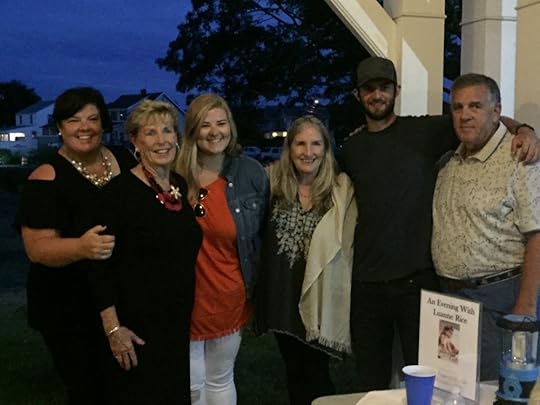
The Pineo-Murdock family! From left--Stacey Pineo Murdock, Danne Pineo, Hallie Murdock, me, Rob Murdock, and Phil Pineo. Rob is an extremely talented musician and composer who entertained on piano while i signed books. Check him out on SoundCloud.
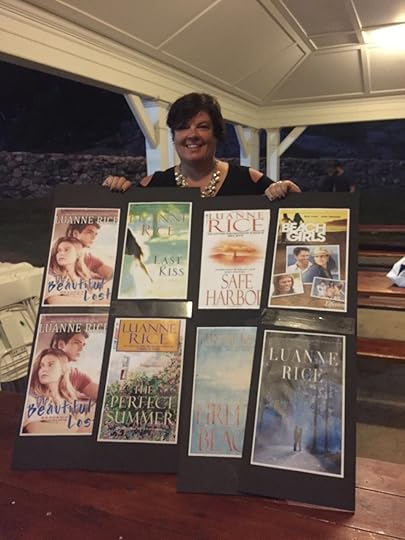
I love these posters Stacey made of some of my book jackets and the DVD of BEACH GIRLS.
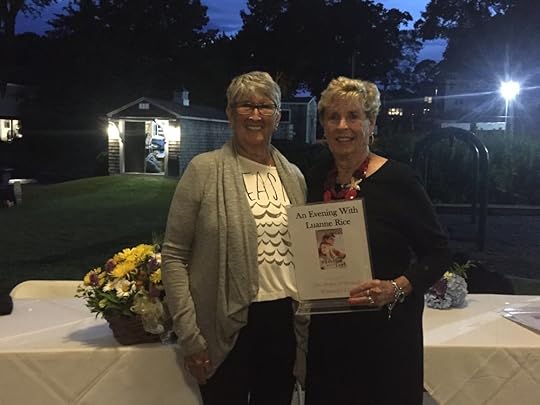
The evening couldn't have happened without Jan and Danne. I can't get over how beautifully they put it together, making sure there were enough chairs (200!) for attendees who RSVP'd right up until the morning of the event; they greeted everyone, made sure they had gift bags (thanks to Stacey,) and directed them to the table where my giveaway books were stacked; so thoughtfully covered the tables with white linen; and although they're not booksellers they knew to get post-it notes and Sharpies for when I signed. Here they are holding a sign with the cover of THE BEAUTIFUL LOST and "An Evening With Luanne Rice." They are incredibly kind and welcoming and made me feel so comfortable.

Hubbard's Point beach
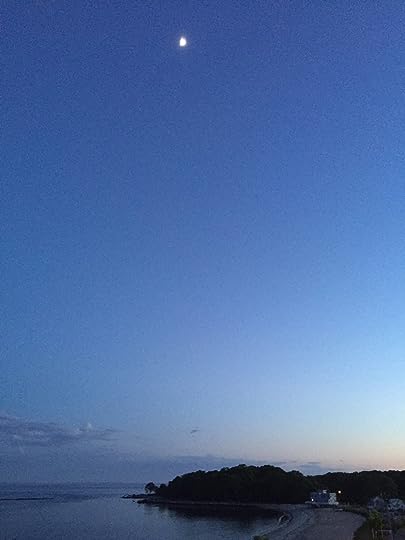
Moonlight on Long Island Sound, evening in this place we love so much.



